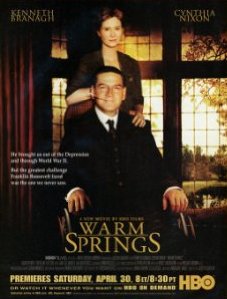Plot
The film opens in 1924 with a paralyzed Franklin D. Roosevelt living in semi-isolation on a Florida houseboat with two male attendants. He reminisces about running as vice president during the 1920 presidential election. Franklin, a Harvard-educated lawyer, New York assemblyman, and assistant Secretary of the Navy, gave a rousing speech in which he mentioned his cousin President Teddy Roosevelt's own run as vice president. Republican Warren Harding won the election, but Franklin's political rise had begun, though his opponents consider the arrogant Franklin a political lightweight.
When Franklin's wife, Eleanor discovered his extra-marital affair, they remained married but with mostly separate lives. When Franklin was suddenly stricken with what was diagnosed as polio, leaving his lower body paralyzed, devastated and refusing to be a burden, Franklin then left for Florida to live on the houseboat.
When a storm wrecks the houseboat, Franklin and his attendants go to a nearby restaurant. Louis Howe, Franklin's political adviser, arrives and attempts to persuade Franklin to return to New York and resume his political career. However, at the same time Franklin receives a letter from an old friend George Foster Peabody who invites Franklin to the Meriweather Inn, the resort he owns in Warm Springs, Georgia. Peabody claims a handicapped boy was able to walk while in the therapeutic mineral waters. Intrigued, Franklin heads to Warm Springs, along with Eleanor.
Franklin and Eleanor discover the Meriweather Inn is extremely rundown. Franklin rejects staying in a two-story residence, fearing being trapped upstairs in a fire, but settles for a small one-story cottage. Once in the pool, Franklin is unable to stand, though resort manager, Tom Loyless, says he will in time. Meanwhile, Eleanor realizes Franklin intends to stay in Georgia.
Appalled by the differences between Georgia and New York and the dilapidated resort, Eleanor urges Franklin to return to New York City, saying it has the best doctors and hospitals in the country. He refuses, believing Warm Springs gives him a chance to walk again. Eleanor returns to New York where Louis launches her career as a social activist. Meanwhile, Franklin is eventually able to stand and move around in the buoyant waters. His celebrity results in an interview with the local newspaper. Franklin feels residents pity him, but Tom assures him that is not the case.
The resort closes for the season. Franklin returns in the spring to discover that after his newspaper interview was nationally syndicated, other polio victims have come to the resort. Franklin angrily storms out; Tom chastises him, saying it is not Franklin's private resort and accuses him of having the same prejudices and pity that other people have towards polio victims.
At the train station, Franklin is about to return to New York. Tom is there to pick up Fred Botts, a newly arriving polio patient. Franklin is appalled that the young man was forced to ride in the baggage car alone and is barely conscious. Franklin berates the indifferent conductor, and he and Tom take the man to the resort to recover since the nearest hospital is all the way in Atlanta and the nearest doctor is also too far away. Tom informs Franklin that, due to the able-bodied guests fearing polio, he cannot use the pool during regular hours or eat in the dining room.
Soon after, physical therapist Helena Mahoney arrives to work at the resort, inspired by Franklin's interview. Helena says the waters are helping Franklin but he needs more pool time than is allowed. Franklin decides to buy the resort and turn it into a polio rehab center.
Franklin learns that Tom has terminal cancer and is returning home to die. Franklin's domineering mother, unable to understand Franklin's purpose at Warm Springs, sends Louis and Eleanor to stop him buying the spa and bring him back to New York. Upon arriving, Eleanor is supportive. She and Franklin begin fund-raising and accept a doctor's offer to evaluate the resort.
Louis believes Franklin is ready to resume his political career, aiming for Governor of New York. Meanwhile, Franklin receives the visiting doctor's unfavorable medical report in which he disputes hydrotherapy's benefits. With plans to turn the resort into a polio rehab center and regain his ability to walk possibly being derailed, Franklin becomes depressed. Helena, Louis and Eleanor persuade him to revive his political career. They devise a method enabling Franklin to appear in public with a cane in his hand and supported by leg braces and minimal human assistance so he can be seen moving around in public without crutches and his wheelchair. The plan works and Franklin is elected Governor of New York.
The epilogue reveals that Franklin won the U.S. presidency four years later and became the only person elected to more than two terms, serving until his death while in office, at his Warm Springs cottage in 1945. The rehab center was Franklin's life insurance beneficiary and continues to operate to this day.
